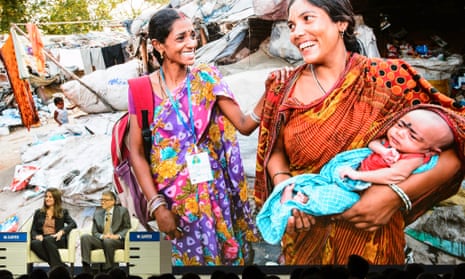As someone who has campaigned to protect and restore forests across the world for decades, it is heartening to see a turnaround in the behaviour of some of the very companies that not so long ago were the villains.
Last week, on my first visit to the World Economic Forum in Davos, it was surprising to see so many global corporations – many that we at Greenpeace have campaigned against – speak passionately about the need to protect indigenous communities, work with smallholders and remove deforestation from the supply chain.
While WEF is mostly a club of the very rich (not the 1% but the .01%), listening to CEOs of major corporations commit to end deforestation while also supporting smallholders, women (who make up 65% of agricultural employment) and indigenous communities was a positive experience and a sea change in attitudes from only a few years ago.
I was even taken by surprise when one CEO of a big agrochemical company congratulated Greenpeace on a report we had produced on how biotechnology can be used to produce more resilient plants. He said his scientists had been very impressed.
It suggested that there may be common ground opening up between us, even if there are still fundamental differences about our vision for the future of food and agriculture.
I saw before me how far we have come from the bad old days. For example, Cargill was one of the first companies I campaigned against to protect the Amazon from destructive soya production for animal feed. Its commitment today, eight years later, to remove commodities that come from deforestation is a massive change.
At a lunch hosted by Unilever CEO Paul Polman and Erna Solberg, the prime minister of Norway, there was a real buzz in the room about the progress that had been made. I watched a broad coalition, including some of the world’s biggest producers and traders of agriculture commodities, come together with consumer goods companies, NGOs and politicians.
Of course, the devil is always in the detail and much work still needs to be done.
Nevertheless, the penny seems to be dropping that our climate, our biodiversity, our water, is dependent on protecting and restoring forests – and business is operating in a degraded world that is both unsustainable and high risk.
The talk was not only about deforestation but also about eradicating hunger. The focus was on the 850 million people who go to bed hungry every night and also on the two billion who suffer from hidden hunger through lack of basic nutrients, such as zinc, iron and vitamin A.
I was a last-minute guest at Davos this year and a slightly reluctant one. My view from afar has always been that it was a club of mainly rich white men from the west discussing how to make more money. Solving the world’s most intractable problems was just a sideline.
Close up, it’s slightly more complex, though some of my preconceptions were reinforced. With only 17% women attending, it was mostly men who discussed how to eradicate issues around poverty that largely affect women.
As for race, I didn’t need to ask the organisers the statistic. I overheard one man’s mobile phone conversation in a crowded hotel lobby “Oh, you will recognise me. I’m black”.
While I heard many fine words at Davos, are we going to see real action as a result?
My impression overall was that the circular arguments probably outweighed the circular economy. Certainly the linear growth model is under more threat from planetary boundaries than Davos man’s ability to conceptualise a more equitable future.
But it would be a mistake to suggest that all businesses in Davos are from the same camp. As one corporate delegate said, there are four types of corporations present:
- The ones that get it and are real leaders in sustainability.
- The slightly bigger number that understand the scale of the challenges but are silent.
- The laggards who stick with business as usual …
- and finally, those he described as the “dark forces”.
The last have mastered the language of sustainable development and use it craftily to deflect action and sow confusion.
One leader who really stood out to me was Amina J. Mohammed from Nigeria, working on the UN sustainable development goals, who pleaded with people to take more risks and share the risks more equitably. As parts of north-east Nigeria slide into failed statehood as a result of deforestation, desertification, drought and poverty, it was a call that needs to be acted on urgently.
The other was Unilever’s Polman, who said: “Let’s be the last generation that has to deal with poverty, and the first generation that deals with climate change.”
I’d add that for that to happen we need more progressive companies to stick their heads above the parapet and walk the talk. In equal measure, we need to remove the ability of some companies to block that progress.
This year’s Davos coverage is funded by The B Team. All content is editorially independent except for pieces labelled “brought to you by”. Find out more here.
Join the community of sustainability professionals and experts. Become a GSB member to get more stories like this direct to your inbox
